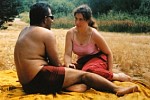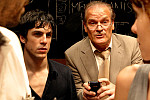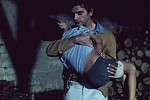 Shadows off the beaten path
Shadows off the beaten pathJUST ANOTHER LOVE STORY | THE LAST OF THE CRAZY PEOPLE
< < F O R E I G N > >
last update 27.May.09
See also: SHADOWS FILM FESTIVAL
 R E V I E W B Y R I C H C L I N E
R E V I E W B Y R I C H C L I N E Slépe Lásky
Slépe Lásky
scr Juraj Lehotsky, Marek Lescák
with Peter Kolesár, Iveta Koprdová, Miro Daniel, Monika Brabcová, Elena, Laco, Zuzana Pohánková, Jolana Danielová, Anna Brabcová, Radoslava Badinková, Gabika, Janko
 release US Mar.09 ciff,
release US Mar.09 ciff, UK 22.May.09
08/Slovakia 1h17
CANNES FILM FEST
TORONTO FILM FEST

 Using an intriguing blend of documentary, fiction and fantasy, Slovakian filmmaker Lehotsky tells four romantic stories about blind or partially sighted people. It's not an easy movie, but adventurous audiences will love it.
Using an intriguing blend of documentary, fiction and fantasy, Slovakian filmmaker Lehotsky tells four romantic stories about blind or partially sighted people. It's not an easy movie, but adventurous audiences will love it.
First we meet Peter and Iveta, a blind couple going about their everyday life, watching the Olympics on TV and teaching piano. Next is Miro, a tough guy who falls for Monika. But he's a shunned gypsy, and her family doesn't want him around her. Third is Elena, a young woman who works as a housecleaner and is worried about having a baby with her equally blind husband Laco. And finally, 14-year-old Zuzana dreams of finding a boyfriend who likes her as she is. She meets a guy online, but is scared to meet him.
Shot over three years, the plotlines developed based on the lives of the characters. But director-cowriter Lehotsky takes a fluid cinematic approach with clever camerawork, witty visuals and an effective asynchronous audio mix that uses dialog as narration and blends sounds with music. The film has a slow, delicate pace that adds an almost melancholy edge to the otherwise sweet and hopeful stories.
Along the way, there are telling touches that transcend the situations. Peter and Iveta live in a grim Soviet-style block covered in graffiti and decay, which they of course can't see. And in the film's most outrageous sequence, Peter imagines himself on an undersea adventure fighting a giant octopus, all while Iveta quietly knits a jumper. It's a sharp injection of Michel Gondry-style animation into a film that's otherwise extremely naturalistic, and it gives us a wonderful look into the minds of the characters.
There are many moments of sharp irony and dark humour. Zuzana has no idea that she's actually a hottie. Miro and Monika are terrified to confront the deep prejudice in their culture, wondering if they can make it on their own. Elena and Laco are frightened of the prospect of being blind parents, even though they both look forward to having a child. In other words, the issues these people face are deeply resonant; we feel their vulnerability and yearning. And in the epilogues, we share their emotions without it ever feeling sentimentalised. [PG themes] Cannes/Toronto/London
16.Apr.09
 R E V I E W B Y R I C H C L I N E
R E V I E W B Y R I C H C L I N E La Habitación de Fermat
La Habitación de Fermat
with Lluís Homar, Alejo Sauras, Elena Ballesteros, Santi Millán, Federico Luppi, Nuria Badia, Mariola Ruiz, Helena Carrión, Victor Benjumea, David Fernández, Josep Minguell, Juanma Falcón

release Sp 16.Nov.07,
US Apr.08 Tribeca,
UK 29.May.09
07/Spain 1h28
 It can't be easy to make such a twisty and clever a thriller based on mathematical theories. But Spanish filmmakers Piedrahita and Sopeña do a terrific job keeping things tense and brainy. And thoroughly entertaining.
It can't be easy to make such a twisty and clever a thriller based on mathematical theories. But Spanish filmmakers Piedrahita and Sopeña do a terrific job keeping things tense and brainy. And thoroughly entertaining.
Sexy young Galois (Sauras) wows the girls at university with his maths prowess. Is this a fantasy sequence dreamed up by a computer geek? No, he's one of four experts invited to an isolated location, given mathematician names and told they'll be solving the biggest enigma ever. The others are Hilbert (Homar), a 64-year-old gentleman; Pascal (Millan), a beardy quick-thinker; and Oliva (Ballesteros), a scooter-riding babe with brains. Their host, Fermat (Luppi), is called away suddenly, leaving the foursome with a riddle. And the walls are closing in.
Fortunately, instead of obscure formulas, the puzzles are tricky brainteasers, which means we can play along with the characters without feeling left too far out in the cold. And with the room shrinking, things start getting extremely tense, especially when the furniture starts splintering around them. As this is happening, they're also trying to solve the bigger question of why they're here in the first place, including an attempt to unravel the connections between them and Fermat's true identity.
And as the room squeezes in and conundrums keep coming, there are a remarkable number of revelations. The four characters react very differently to all of this; some use brains to figure out alternatives, others try brute force and at one point Galois combines the two with an engineering solution. But the walls relentlessly keep moving, and the biggest enigma may turn out to be how to survive this crazy day.
This is played coolly by the cast, with likeable wit that's realistically grounded. And the filmmakers establish a brilliant visual style with unusual, telling angles that make great use of lines, proportions and numbers. There are also scenes outside the room, as we follow Fermat on his own journey. One convenient plot point provides the only false note; otherwise the film keeps us gasping or laughing at this playful bundle of mystery, hints, innuendo and lots of red herrings. And it's great fun to figure out what's what.
19.May.09
 R E V I E W B Y R I C H C L I N E
R E V I E W B Y R I C H C L I N E Kærlighed På Film
Kærlighed På Film
with Anders W Berthelsen, Rebecka Hemse, Nikolaj Lie Kaas, Charlotte Fich, Dejan Cukic, Karsten Jansfort, Flemming Enevold, Bent Mejding, Ewa Fröling, Josephine Raahauge, Timm Vladimir, Ditte Hansen
 release Den 24.Aug.07,
release Den 24.Aug.07, US 9.Jan.09, UK 24.Jul.09
07/Den 1h44

 Starting as a quiet drama about identity and obsession, along the lines of While You Were Sleeping, this Danish noir thriller drifts more towards Vertigo as it develops. And then it breaks into pure ironic terror. Even though it's sometimes contrived, it's utterly gripping.
Starting as a quiet drama about identity and obsession, along the lines of While You Were Sleeping, this Danish noir thriller drifts more towards Vertigo as it develops. And then it breaks into pure ironic terror. Even though it's sometimes contrived, it's utterly gripping.
Forensic photographer Jonas (Berthelsen) narrates his own story, Sunset Blvd-style, through a series of flashbacks. After rescuing the helpless, beautiful Julia (Hemse), he allows her family to think he's her boyfriend. He knows he should tell the truth, but the mystery is too inviting, and when she wakes from her coma, her memory and vision cloud her understanding. The problem is that Jonas is married to Mette (Fich), and as he obsesses over Julia he begins to forget who he really is.
The film's tricky structure keeps us on our toes through constant revelations and plot twists, as each flashback fits together into a puzzle that's both unsettling and involving. Filmmaker Bornedal creates a purring narrative with dark, sweaty imagery stylishly edited and combined with sleek effects work. Watching this unfold is a strangely hypnotic experience, and we follow the events through Jonas' limited perspective, just as fascinated as he is by the intrigue of it all.
And it gets seriously deranged as it progresses, with a sinister wheelchair-bound figure wrapped in bandages lurking in the background in the hospital. This is an increasingly dark, creepy film that jarringly crosscuts between the past and present until, like the characters, we're not quite sure who's who anymore. Everyone's aware that something's not quite right, but the big picture remains maddeningly jumbled. As Jonas tries to face up to what he has done to both of the women in his life, he begins to lose a grip on himself.
In the end, it gets rather overwrought, with an over-the-top snarling villain and a grisly finale that doesn't quite hang together. But the contrast between relaxed realism (Jonas with his happy family) and nightmarish horror is both effective and entertaining. And the film has a terrific sense of bitter irony as plays with our ideas of identity and belonging.
26.Jun.08 eiff
 R E V I E W B Y R I C H C L I N E
R E V I E W B Y R I C H C L I N E Le Dernier des Fous
Le Dernier des Fous
scr Laurent Achard, Nathalie Najem
with Julien Cochelin, Pascal Cervo, Fettouma Bouamari, Annie Cordy, Jean-Yves Chatelais, Dominique Reymond, Florence Giorgetti, Dorine Bouteiller, Thomas Laroppe, Nicolas Pignon, Chamsedine Miri, Nicolas Leclere

release Fr 3.Jan.07,
UK 18.May.09 dvd
06/France 1h34


 This low-key, moody French drama limits its own impact by sticking to the perspective of a young boy. As a result, its provocative themes feel elusive and unresolved, even though it's emotionally authentic.
This low-key, moody French drama limits its own impact by sticking to the perspective of a young boy. As a result, its provocative themes feel elusive and unresolved, even though it's emotionally authentic.
Martin (Cochelin) is 11 years old, living in a vast family home with his big brother Didier (Cervo) and their dithering dad Jean (Chatelais), while their mother Nadege (Reymond) stays locked in her room and the house is run by Jean's domineering mother (Cordy). While everyone's preoccupied with Nadege's histrionics, Martin observes Didier's deep heartbreak when his boyfriend (Laroppe) gives in to family pressures and leaves to get married. Amid all of this, the only one who seems to notice the increasingly troubled Martin is the North African maid Malika (Bouamari).
Filmmaker Achard strikes a gloomy, gothic tone from the start, so we know this is not going to end well. And everyone's emotional turmoil is just waiting to boil over into something nasty. Along the way, there are distractions and red herrings in the arrival of the outrageous, drunken Jacqueline (Giorgetti) or a neighbour girl (Bouteiller) who befriends Martin. All of this is played out without much dialog, as Achard observes scenes from Martin's point of view. And this boy clearly can't understand what's going on around him.
Fortunately, Martin is also extremely curious, so keeps digging into each aspect of the rather overwrought life around him, exploring the relationships and ideas, trying to make sense of the seemingly momentous events that are making everyone, yes, crazy. The film vividly catches that childish sense of being left out of the adult world, although it's unclear what the point is for those of us in the audience.
While this approach is intriguing and involving, it's also maddening and depressing to watch this story in this way, as we only have glimpses, insinuations and tiny fragments of information to go on. At least the acting is excellent across the board, with a particularly haunting performance from the young Cochelin. And in the end it's almost overpoweringly emotional and harrowing.
10.May.09


See also: SHADOWS FILM FESTIVAL
© 2009 by Rich Cline, Shadows
on the Wall